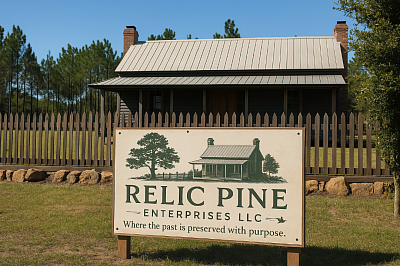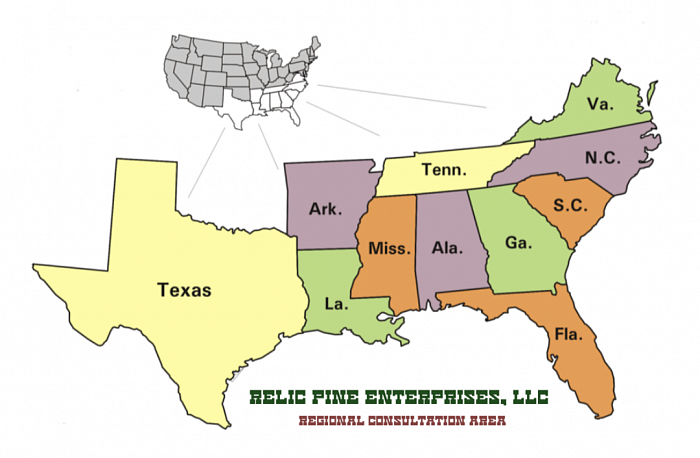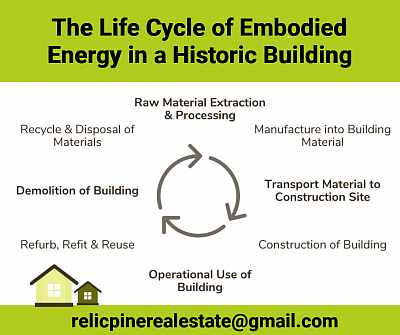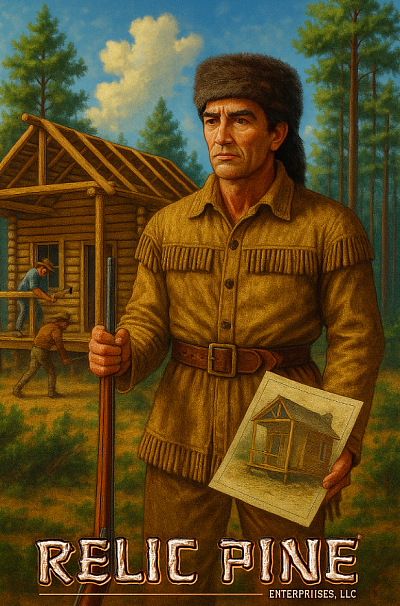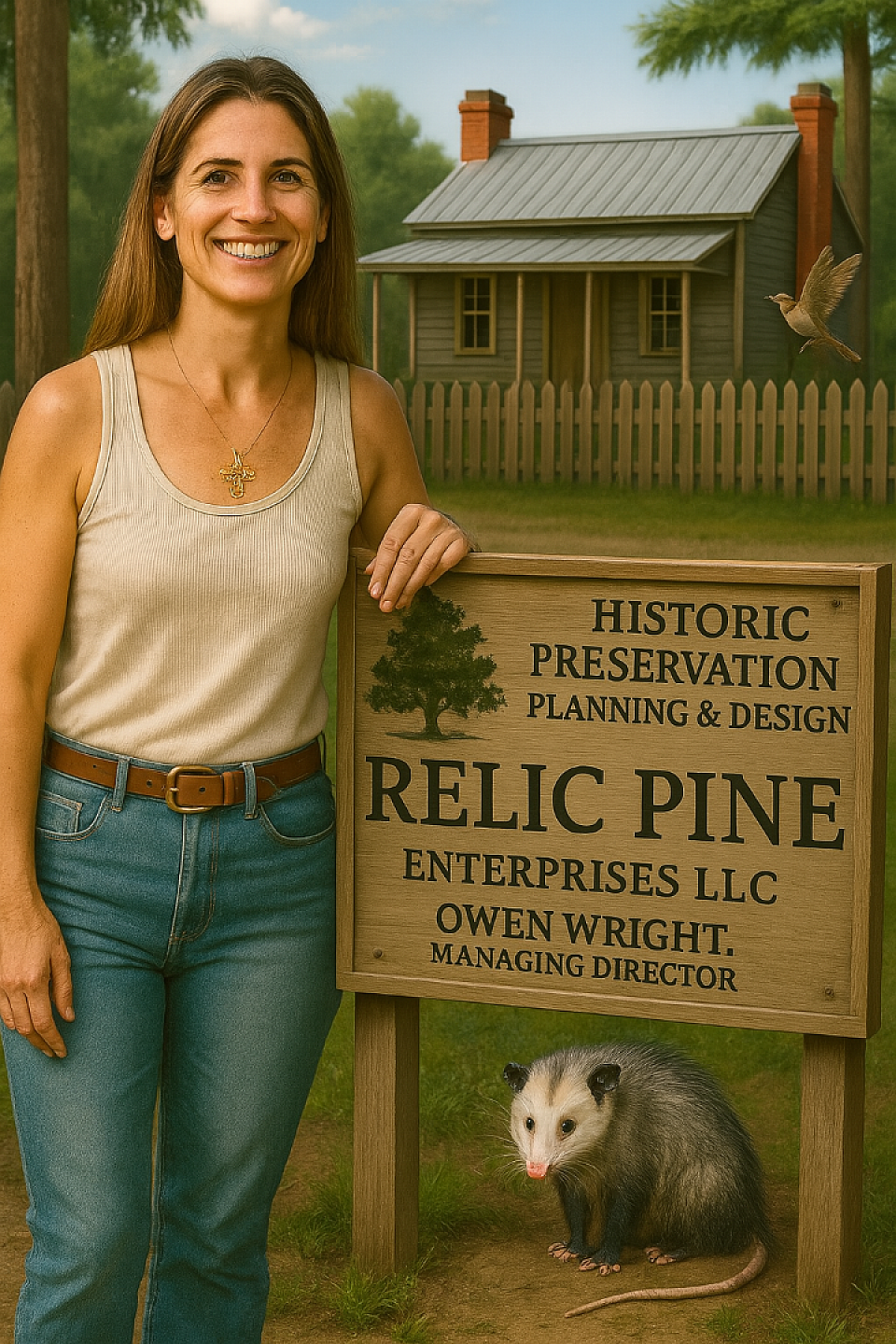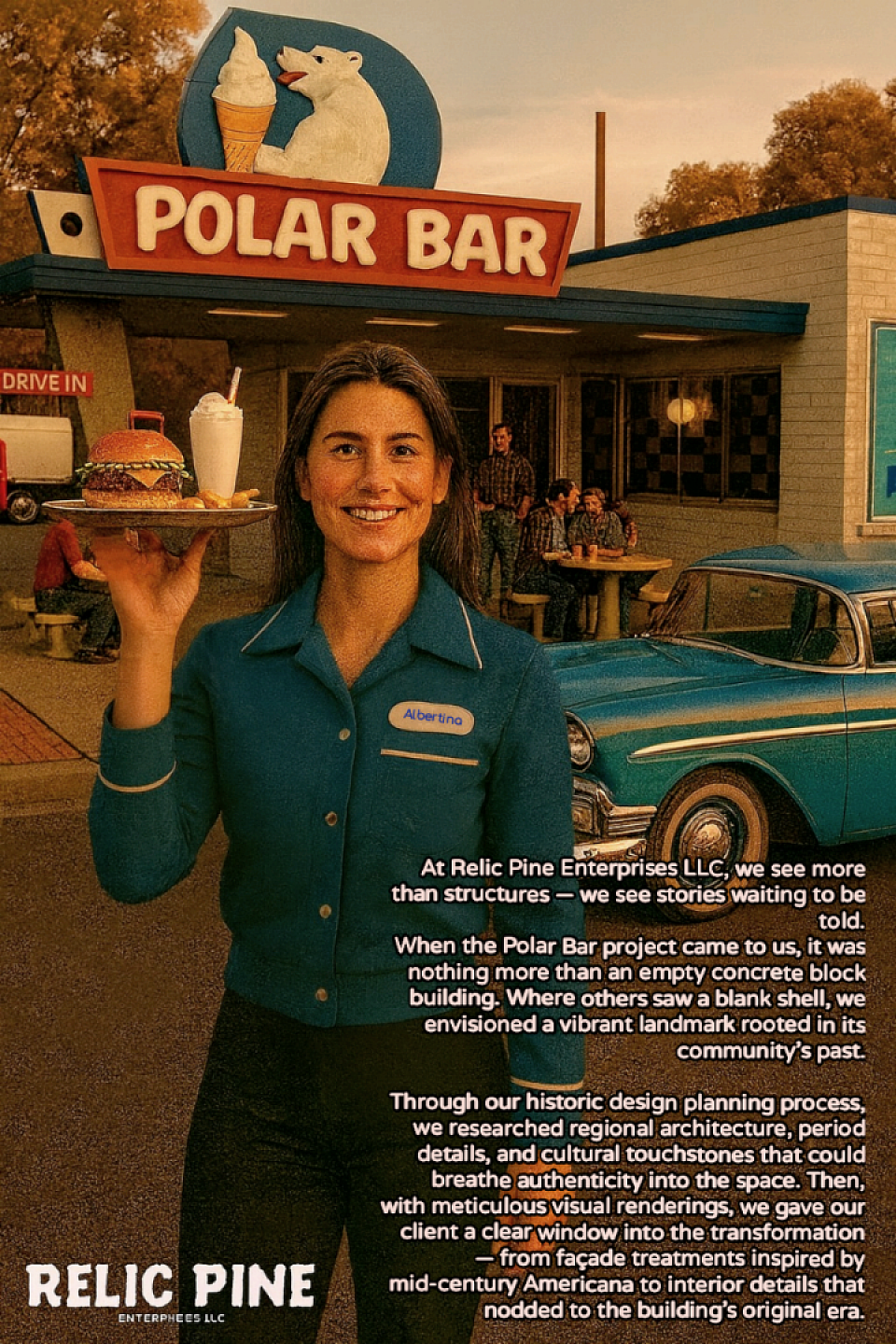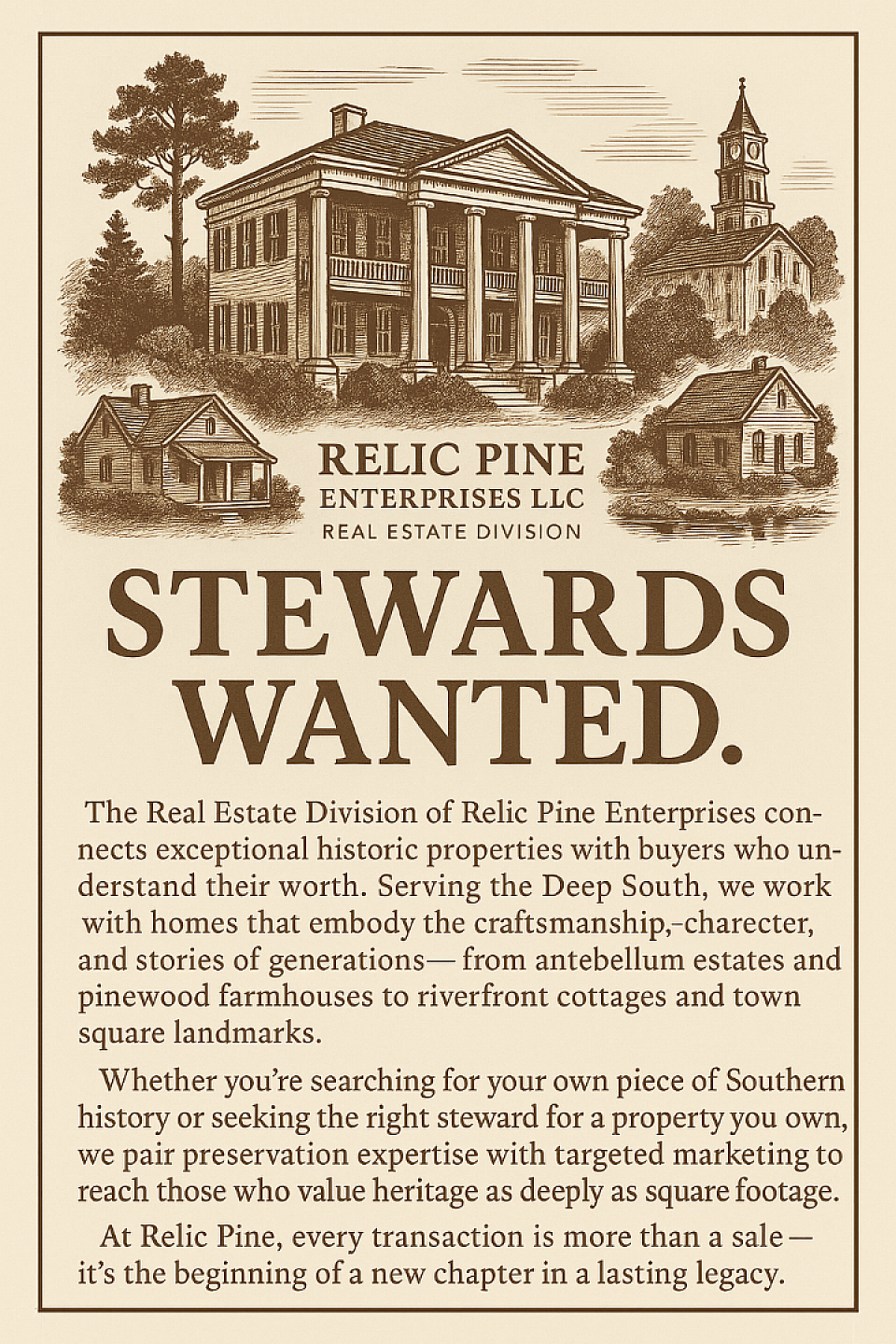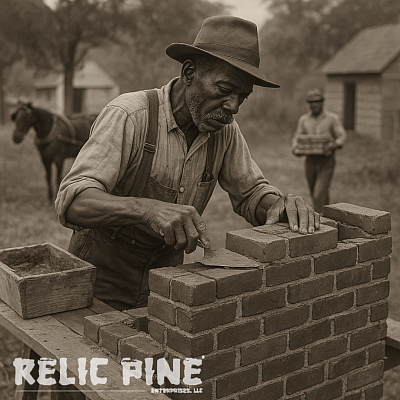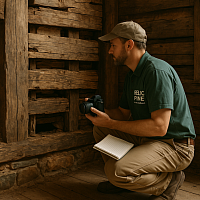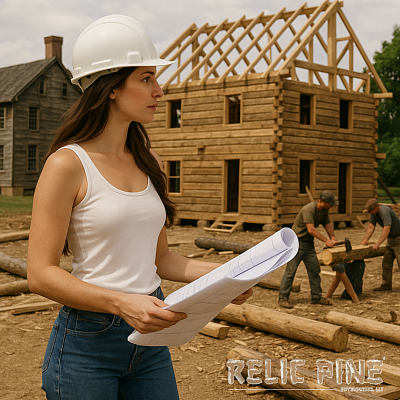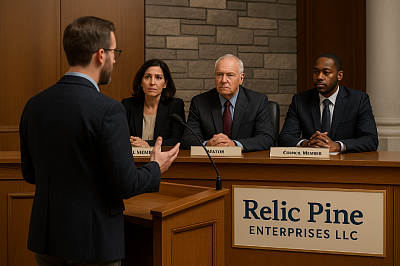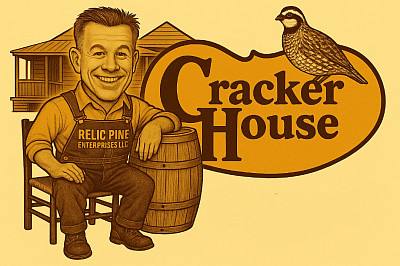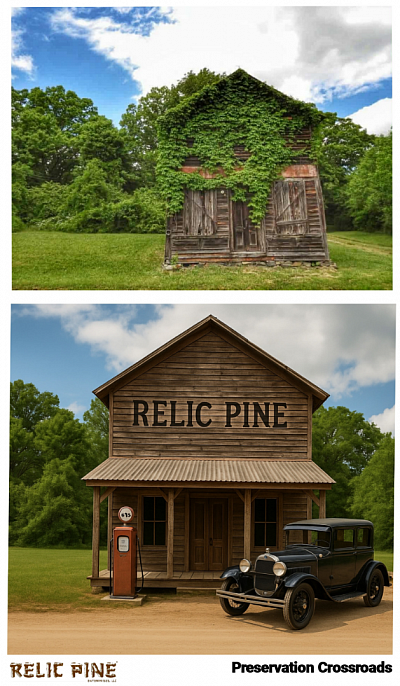Bringing the Past "Back to the Future"!
Our architectural designs work because we never try to make an historic home anything more than what it was intended to be. Relic Pine first developed the "Origin Approach" to historic rehabilitation.
At Relic Pine Enterprises, we are devoted to the art of resurrection– breathing new life into the Cracker Houses of the Deep South while preserving their soul and story. Guided by the standards of the National Park Service and the spirit of lsaiah 58:12, we restore these timeworn homes with reverence, craftsmanship, and purpose.
Our mission is to honor the past by adapting it for the future, crafting spaces where heritage and modern living coexist, where weathered pine speaks, and where every board remembers. We are not merely builders, but stewards of legacy reclaiming beauty from ruin and rooting tomorrow in the sacred ground of yesterday.
Still Wired: How the Past Connects Us to What Comes Next
In rural Southern Georgia and North Florida, the past is not a relic — it’s a resource.
The weathered phone still wired to a pole beside a peanut field is more than a curiosity. It’s a reminder that what was built with care, purpose, and simplicity can still serve — even in a world of constant upgrades.
At Relic Pine Enterprises LLC, we believe the rural nuances of the past aren’t barriers to progress. They are blueprints for resilience, function, and meaning.
Old structures, traditional materials, hand-dug wells, tin roofs, and pine sills — these weren’t just practical solutions for their time. They were crafted with an understanding of place, climate, and community. That wisdom still holds value today.
Our work brings modern utility to historic form — not to erase the past, but to extend its usefulness into the future. We embrace innovation, but not at the expense of identity. Because preservation isn’t about looking back. It’s about holding on to what still works, still matters, and still teaches.
That old field phone may not have a touchscreen — but when it rings, it reminds us: sometimes the clearest connection to the future is still wired through the past.
Principle of Embodied Energy
Relic Pine was founded upon a set of standards for the treatment of historic properties: preservation, rehabilitation, restoration, and reconstruction. At the heart of our approach rests history, heritage, sustainability, quality of life, and the conservation of embodied energy.
Embodied energy is the energy consumed by all of the processes associated with the production of a building, from the mining and processing of natural resources to manufacturing, transport and product delivery. Embodied energy DOES NOT include the demolition and disposal of the building material.
When an historic building or structure is lost due to demolition by neglect or to clear the way for new construction we not only lose tangible links to our past, we also waste the embodied energy that was invested in its initial design and construction.
Historic Preservation and sustainability are natural partners. Preservation and reuse of historic buildings reduces resource and material consumption, puts less waste in landfills, and consumes less energy than demolishing buildings and constructing new ones.
Interestingly, more local jobs are created using the principles of historic preservation than those associated with new construction.
ORIGIN STORY
“Rooted in the Past. Built for Tomorrow.”
In the heart of the Deep South, where pine forests whisper the stories of centuries past and hidden dogtrot cabins still cling to the earth with quiet dignity, Relic Pine Enterprises, LLC was born—not out of a blueprint, but out of a calling.
It began with a single structure: a crumbling cracker house, half-swallowed by urbanization and time. Most saw ruin. But founder Owen Wright saw something different. He saw possibility. He saw heritage. He saw the need for historic visioning—the ability to see not just what a place was, but what it could be again, when respected by the hands of skilled artisans and preserved with purpose.
Relic Pine Enterprises emerged from that first act of rural preservation—not as a development company, but as a stewardship enterprise. Owen and his small merry band of craftsmen didn’t just restore buildings. They rekindled stories, honored the strength of old-growth lumber, and worked in alignment with National Park Service Standards to breathe 21st-century life into 19th-century design.
Historic visioning became their guiding principle: an artful fusion of imagination and reverence. Each project became a conversation between generations—bridging the pioneer spirit of the past with the evolving needs of the modern South. From front porches shaded by live oaks to wide breezeways that once cooled frontier families, every restoration carried the rhythm of history forward.
Today, Relic Pine Enterprises, LLC continues to craft legacy from lumber, and legacy from labor. Because in a world chasing speed and steel, they choose to preserve the slow truths carved into pine—reclaimed, restored, and reborn.
Relic Pine Enterprises, LLC: Historic Visioning. Southern Integrity. Timeless Craft.
Frontier Modern Design at Relic Pine
In a world barreling toward the disposable and digital, Frontier Modern Design stands like a weathered fence post on the edge of a forgotten pasture — grounded, timeworn, and still holding the line. It was born not in a boardroom but in the sawdust and sunlight of a reclaimed cracker house, deep in the longleaf pine flatwoods of South Georgia.
Coined by Owen Wright, founder of Relic Pine Enterprises, LLC, Frontier Modern Design™ bridges two powerful legacies: the rugged self-sufficiency of the American frontier and the clean, honest innovation of modern design. It’s not a trend. It’s a reckoning — with history, with materials, with the spirit of place.
At its core, Frontier Modern is a design ethos forged by necessity and refined by intention. It draws from the past without mimicking it. It’s the use of hand-hewn heart pine beams beside minimalist cabinetry. A woodstove framed by salvaged tabby concrete. A restored shotgun cabin featuring a glass wall overlooking wild pasture. Frontier Modern doesn’t hide its scars — it honors them, integrates them, and makes them part of the story.
Relic Pine Enterprises applies this philosophy to every restoration and new-build commission. Whether reviving an 1870s homestead or fabricating bespoke furniture from sinker cypress, the Frontier Modern aesthetic is both reverent and forward-facing. It respects the land and elevates the materials that once served survival into the realm of quiet luxury.
Where traditional modernism favors industrial anonymity, Frontier Modern insists on place — on sweat, soil, and story. Every board has a lineage. Every space has a conscience.
Through Frontier Modern Design™, Relic Pine Enterprises proves that progress doesn’t mean erasing the past. It means building upon it — with craft, with clarity, and with courage.
As Owen Wright often says,
“We don’t live in the past — but we can build with it."
THE LEGACY OF JOHN C. WATERS
Relic Pine Enterprises LLC
Where the Past is Preserved with Purpose
At Relic Pine Enterprises, our vision for preservation is deeply rooted in the wisdom and example of the late John C. Waters, Professor Emeritus in Historic Preservation and Historic Landscape Design at the University of Georgia.
Professor Waters taught that preservation is more than saving old buildings—it is the art of safeguarding the soul of a place. A structure’s true worth lies not only in its architecture, but in the way it reflects the land, the people, and the culture that shaped it. This holistic philosophy—where building, landscape, and story are inseparable—forms the cornerstone of Relic Pine’s approach.
His influence guides every decision we make. Whether addressing a cracked tabby foundation, restoring the strength of a weathered pine beam, or protecting the sightlines of a centuries-old live oak, we work with his conviction that restoration must honor the landscape as much as the building itself. Professor Waters impressed upon us that preservation requires restraint as much as action—that knowing what not to change is as vital as knowing what to restore.
We carry forward his legacy by treating each project as a living classroom. Our work blends field-tested craftsmanship with scholarly discipline, ensuring that every detail meets the highest preservation standards while remaining true to its history and setting. Whether restoring a frontier-era cracker cottage, reviving a historic town square, or conserving a heritage garden, we follow the integrated vision that Professor Waters championed: the harmony of architecture, landscape, the decorative arts, and community memory.
In every salvaged beam, every hand-mortared joint, and every preserved vista, we see his lasting imprint—a reminder that preservation is not merely about looking back, but about carrying the past forward with integrity.
Relic Pine Enterprises LLC
Where craftsmanship meets scholarship, and history finds its rightful place in tomorrow.
Reflections
My memories of John C. Waters are stitched together like the well-worn fabric of a beloved armchair—comfortable, dignified, and rich with character. I can still see him, tall and steady, welcoming me at the door of Greyside with that knowing smile of his, Charlotte at his side, and Beauregard Dunalith III—ever the genteel hound—circling my legs in quiet approval.
John’s hospitality was of the rare, old Southern variety—not the mere offering of food and drink, but the full embrace of friendship, culture, and conversation. His kitchen was a stage for his quiet mastery, and nowhere did that shine more than in his Country Captain—a dish he prepared with the patience of a historian and the precision of an architect. The fragrance alone could stop you in your tracks, and the first bite always carried the warmth of a story well told.
We spent countless evenings in Greyside’s parlor, that fine old room where time seemed to move differently. The air would fill with the sound of a mantle clock’s steady tick, the clink of ice in a highball glass, and the gentle hum of conversation that wandered from world events to the most delicate intricacies of historic preservation. John had a way of making university politics sound like matters of state, and matters of state sound like stories from an old family album.
We spoke often of the beauty of historic gardens, how each path and planting told a story, and of the refined elegance of Southern decorative arts—the way a turned leg or a gilded frame could speak as eloquently as a written word. And always, there was that glass of bourbon in hand, perfectly chilled, perfectly measured, as much a part of the ritual as the talk itself.
John’s presence was a rare blend of intellect, grace, and grounded humanity. Charlotte’s warmth and wit completed the welcome, and Beauregard, in his silent, noble way, sealed it with a watchful eye. Those evenings at Greyside remain some of the most treasured chapters in my own story—chapters written in friendship, in history, and in the kind of Southern civility that is all too rare in this world.
— Owen Wright
Managing Director, Relic Pine Enterprises LLC
Preservation on the Georgia FrontierA Story of Resilience
On the far edges of the Georgia frontier, a house was never merely a house. It was a bulwark against hunger and hardship, a beacon of firelight in a wilderness where empires collided. From Spanish raids sweeping north out of Florida, to bitter clashes with the Creek Nation, to the grinding advance of King Cotton and the steel plow, these dwellings stood as the last line of defense for a growing nation. Their timbers bore the weight of independence and survival. Their wide porches cooled the long summer winds. Their chimneys rose as both hearth and shield. This was not architecture of grandeur, but of isolated courage — rough-hewn monuments to the human will to endure.
Yet the very forces that forged these homes also conspired to erase them. Raids left them lifeless, abandoned to weeds and silence. Agriculture scoured them from the earth, replacing log walls with furrows and cotton rows. For those that lingered along dusty roadsides and fields, neglect proved as ruthless as any invading army. Today, modern development continues the assault still: subdivisions press against old fence rows, cheap houses replace hand-notched timbers, and stories vanish as surely as untreated wood decays. What disappears is not only an architectural legacy, but the living context itself — the meadows, the trails, the memory of lives that dared to shape a nation.
At Relic Pine Enterprises LLC, we believe preservation must be more than the saving of walls and roofs. It is an act of remembrance, stewardship, and respect. Our work begins by placing each home back within its frontier context — retracing mission routes, trading paths, and farmsteads to see it whole again. Preservation, to us, is not about freezing a house in amber, but honoring its evolution. The frontier was never still, and neither can its future be. Just as settlers adapted to weather, to raid, to famine, so too must we adapt these dwellings with quiet care — letting them breathe again without stripping away their integrity; allowing them to protect and nurture a new generation of pioneers.
Relic Pine Enterprises LLC — We are American, and here the past is preserved with purpose.
The Art of Historic Mortar
At Relic Pine Enterprises LLC, preservation is measured not only in the walls we save, but in the very seams that bind them. For brick buildings of the South — churches, warehouses, schools, and homesteads — the mortar is more than filler. It is history itself, a blend of lime, sand, and time-honored craft that once breathed with the building.
Repointing these walls requires more than skill with a trowel. It demands an understanding of the chemistry, the textures, and the rhythms of the past. Unlike modern Portland-based mortars, which harden like stone and suffocate the bricks around them, historic lime-based mortars are soft, porous, and forgiving. They expand and contract with the seasons, wick away moisture, and allow the wall to endure century after century.
Our craftsmen return to traditional formulas, where natural lime is slaked and blended with clean, sharp sand in a ratio of one part lime to two and a half to three parts sand. This balance, tested through centuries of use, produces a mortar that is strong yet flexible, durable yet breathable. The sand is carefully chosen for color and grain to match the original, ensuring repairs are seamless both in performance and appearance.
At Relic Pine, we mix and test each batch with the same care as the original builders. Every joint we repoint is done with the intent that the new work disappears into the old — invisible, yet essential.
This is not just repair. It is stewardship. The right mortar does more than hold a wall together; it preserves its ability to breathe, to shed water, and to endure another hundred years without fracture. Our work, when done properly, cannot be seen — and that is precisely the point.
When you entrust us with your historic masonry, you are entrusting us with the very life of the wall. With each lime batch we mix, and each joint we fill, we are not only restoring a building — we are restoring a tradition of craft and respect.
Relic Pine Enterprises LLC
Where the past is preserved with purpose.
Structural Inconsistencies and Historical Value
Every historic house carries its own fingerprints of age: a sill beam cut too thin, a board long fallen away, a gap where rain and creatures slip inside. To some, these are flaws. To us, they are the very clues that guide the work of true preservation.
At Relic Pine Enterprises, discovery comes first. We peel back layers to find what time and weather have hidden — the misshapen timbers, the open joints, the places where the past still breathes. Each discrepancy tells us how the house has endured, and how best to prepare it for another century of life.
Building with Integrity: Historic New Construction
At Relic Pine Enterprises, LLC, we understand that historic preservation does not always mean working only with what survives. Sometimes, it means reconstructing what has been lost — with honesty, precision, and respect. The Secretary of the Interior’s Standards for Reconstruction guide our work, ensuring that any new construction within a historic context reflects authenticity, sensitivity, and craftsmanship.
Why Reconstruction Matters
Historic streetscapes and properties tell stories not just through the homes that remain, but also through the careful filling of gaps left by time, disaster, or neglect. A missing structure can disrupt the rhythm of a neighborhood, erode its sense of place, and diminish its heritage value. By following federal standards, we recreate these lost elements with fidelity, strengthening the architectural fabric so that communities once again feel whole.
Reconstruction is not about imitation — it is about continuity. A properly executed historic new construction respects its neighbors, complements the surviving architecture, and restores the sense of identity that defines a place.
A Financial Advantage
In the right scenarios, historic new construction can qualify for federal and state historic tax credits, offering substantial incentives to property owners and developers. These credits make the preservation of heritage not only culturally valuable but also economically practical. Relic Pine professionals help clients navigate this process, ensuring that their projects meet the rigorous criteria for eligibility.
Always On Duty
Every project carries unique challenges — questions of design integrity, material authenticity, or eligibility for credits. That is why Relic Pine Enterprises’ team of preservation professionals is always on duty. Whether advising on a single structure or guiding a streetscape-scale initiative, our specialists provide the expertise, the care, and the dedication needed to ensure that every project honors the past while strengthening the future.
At Relic Pine Enterprises, we don’t just build houses. We restore legacies.
Cutting Through the Red Tape
Historic preservation projects face more than just structural challenges. Zoning laws, building codes, and preservation guidelines often overlap, contradict, and stall progress — leaving too many projects tangled in bureaucracy.
At Relic Pine Enterprises LLC, we view these hurdles not as obstacles, but as part of the preservation craft. Our team navigates the web of regulations with precision and persistence — anticipating conflicts before they arise, preparing the detailed documentation regulators demand, and working directly with planning boards and preservation commissions to keep projects moving.
By cultivating strong relationships with local authorities and grounding our work in the Secretary of the Interior’s Standards, we transform red tape into a roadmap. From securing tax credits to negotiating variances and presenting alternative compliance strategies, we serve as advocates for both our clients and the history entrusted to us.
The result is fewer delays, fewer surprises, and complete confidence that every project will meet requirements without sacrificing authenticity.
We don’t just restore buildings — we guide them safely through the gauntlet of regulation, turning red tape into a roadmap for preservation success.
The Drumbeat of Southern Tradition: It's all about Cultural Conservation
At Relic Pine, we hold fast to the power of tradition. We do not chase fleeting trends or reinterpret culture for novelty’s sake, nor do we believe that every change uplifts the human spirit. For us, tradition is a compass—steady, enduring, and true. It reminds us that not all progress is good for the soul, and that the deepest strength often lies in honoring what has already endured.
Relic Pine Enterprises, LLC stands apart by championing the quality and integrity of American heritage, guided by tradition rather than trend.
Relic Pine Enterprises LLC – Preservation Crossroads
At the forgotten crossroads of the Deep South, weathered buildings stand as quiet witnesses to generations of community, commerce, and fellowship. What once served as the beating heart of rural life—small groceries stocked with local produce, dry goods, and farm supplies—now teeter on the edge of erasure, hidden beneath vines and time.
Relic Pine Enterprises LLC believes these structures deserve more than abandonment. They deserve revival.
Through meticulous research, documentation, restoration, and preservation, our team reclaims these landmarks of rural heritage. A once-shuttered storefront becomes a proud symbol again—a gathering place restored to its original dignity, where a tin-roofed porch shades neighbors and travelers alike, and the stories of old crossroads towns are given fresh breath.
Our vision extends beyond individual projects. Relic Pine staff are working to establish Rural Preservation Districts—living collections of historic farmsteads, general stores, turpentine camps, and community landmarks. These districts do more than protect architecture; they preserve the fabric of place itself. With state and federal recognition, they can secure long-term protection, incentives, and opportunities for education, tourism, and sustainable use.
In restoring the small and the humble, we rebuild the great and enduring: a cultural landscape where heritage fuels resilience. At Relic Pine, every nail, every board, and every beam speaks to the promise that the past can guide the future.
Relic Pine Enterprises LLC
“Where the Past is Preserved with Purpose.”
The Tools of Vision
At Relic Pine Enterprises, LLC, we believe historic preservation begins with imagination. For decades, AutoCAD has been the industry’s standard—producing precise technical drawings essential for compliance and construction. These drawings remain a cornerstone of our work, ensuring every beam and brick respects both engineering and historic standards.
But AutoCAD alone cannot answer the deeper question clients often ask: “What will it feel like?”
That’s where contemporary AI renderings transform the process. Within hours, our design team can create photorealistic visions of a restored cabin, barn, or dog-trot house—showing variations in rooflines, porches, paint colors, and landscapes. These lifelike images allow clients to explore possibilities, builders to anticipate craftsmanship challenges, and communities to see the past reborn before the first nail is driven.
We do not choose between AutoCAD and AI—we unite them. AI inspires the vision. AutoCAD secures the blueprint. Together, they guide our builders in recreating the architecture of the Southern frontier with clarity, integrity, and purpose.
At Relic Pine Enterprises, LLC, we harness the best of modern tools to revive the wisdom of yesterday.
